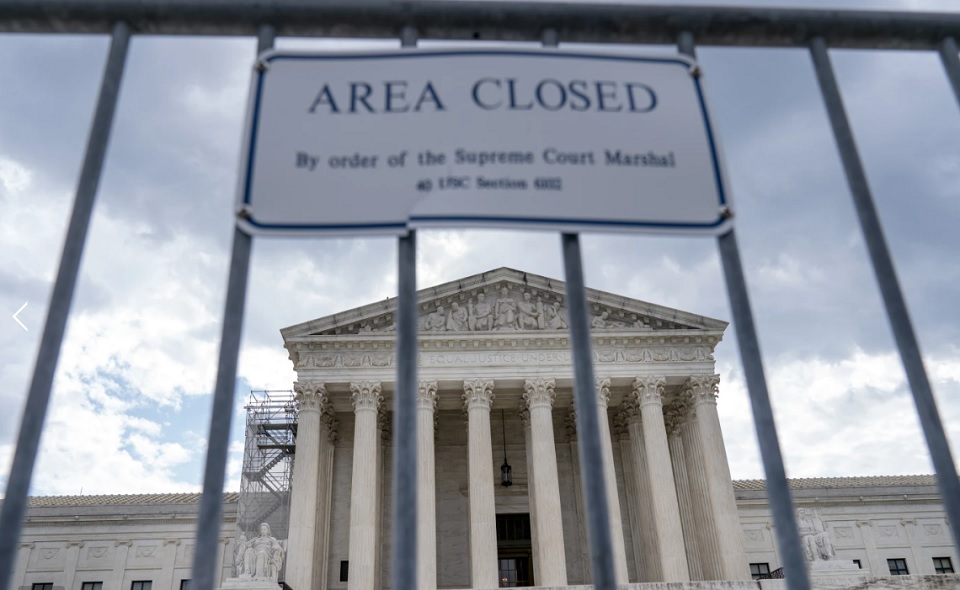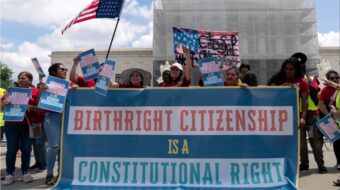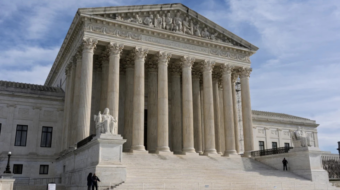
WASHINGTON—With their ruling in Moore v. Harper yesterday the Supreme Court, by a 6-3 margin, said state courts can weigh in on election laws and policies passed by state legislatures. The ruling by the SCOTUS falls far short, however, of guaranteeing democracy when it comes to elections in the U.S.
As a result of the ruling, a progressive state court could indeed curb a right-wing state legislative body that, for example, might select fake electors to nullify the choice of voters in a presidential election. It would also allow, however, a state court to impose un-democratic and gerrymandered district lines. And also dangerous, it would allow the Supreme Court itself, as it did in Bush vs. Gore, to overturn the results of the popular national choice, Al Gore, and replace him with the loser, George Bush.
The only real solution is the passage of strong electoral reform by the U.S. Congress, a reform that closes off and bans all the manipulative tools that the GOP has been using including closing of polling places, ending of vote by mail, gerrymandering, selection of fake electors and so many of the other tools to thwart democracy that the right wing has been using.
It would be a mistake to rest easy with the right-wingers now dominating the High Court itself. They can be expected to continue their attacks on democracy and the rule of law. No one needs a reminder about what they did to abortion rights and key matters like affirmative action are about to be decided by the Court.
Without new comprehensive laws to protect women’s rights and democracy in our elections, there could be nothing but perhaps overwhelming mass protests and the defeat of Republicans up and down the ballot lines to stop the right-wing Court majority from further encroachments on democracy.
What they did in 2000
That’s what the justices did in the 2000 presidential election when on a party-line vote, they installed Republican George W. Bush in the White House by halting a state Supreme Court-ordered recount in the deciding state, Florida.
The right-wingers also have installed ideologues in states’ judicial robes. The North Carolina court in this case, Moore v Harper, fell to their control in last November’s election. The right-wing judges revisited earlier state court rulings against the gerrymandering done by Republicans and cemented them back in place.
And the Federalist Society—the driver of those ideologues—picked judges for Gov. Ron DeSantis, R-Fla., to co-opt that court, too.
And of course, the ruling yesterday does nothing to stop courts, when they can, from issuing anti-worker rulings to compliment their attacks on electoral democracy. That prompted one commentator, Teachers (AFT) President Randi Weingarten, to say Congress must step in with comprehensive election reform to forestall any future manipulation.
Moore v Harper pitted the Republican-gerrymandered North Carolina legislature against what was then a 4-3 Democratic state Supreme Court. After the November election, it’s now 5-2 Republican.
“The elections clause” of the Constitution, which includes the “state legislatures’ authority the radical right cited, “does not vest exclusive and independent authority in state legislatures to set the rules regarding federal elections,” Chief Justice Roberts declared. in the ruling for the majority. It is clear that his arguments are at least as much if not more for court control of elections as they are for democracy.
“State courts had already begun to impose restraints on state legislatures, even before the Constitutional Convention, and the practice continued to mature during the founding era,” Roberts wrote, co-opting the “originalism” theory right-wing justices push to justify their other rulings.
“James Madison extolled judicial review as one of the key virtues of a constitutional system…The Elections Clause does not carve out an exception to that fundamental principle. When state legislatures prescribe the rules concerning federal elections, they remain subject to the ordinary exercise of state judicial review.”
To give you an idea of the practical—and horrifying—effect of the right-wing state legislative theory, however, the Washington Post reported on June 27 that Donald Trump’s attorneys argued to Justice Department Special Counsel Jack Smith that “there was nothing criminal about preparing alternate slates of electors in case state legislatures blocked Biden’s slates.” Smith is investigating the Jan. 6, 2021 Trumpite rebellion, insurrection and coup d’etat.
Trump’s team pushed alternate slates of electors in the key swing states of Michigan, Pennsylvania, Wisconsin, Georgia, Arizona, and Nevada, all of which Biden won in the popular vote.
Had the Independent State Legislatures theory been in effect, nobody could have stopped the heavily Republican-gerrymandered legislatures in the first five from approving the Trumpite electors. The switch of those five, with their 73 electoral votes, would have put Trump back in the Oval Office.
Honored settled precedent
“Today, the court decided to honor settled precedent and reject the ‘independent state legislature’ theory—-a baseless thought bubble from the extremist MAGA fringe that could have struck a major blow to free and fair elections. The justices correctly noted that states cannot evade the requirements of federal law,” said Weingarten, a New York City civics teacher who also has a law degree.
“This decision is a welcome relief, but the outcome should never have been in doubt–especially after Jan. 6, 2021, when the idea of counting every vote seemed to dangle in the balance.” Weingarten made it clear, however, that she does not trust leaving the voting rights matters and electoral democracy in the hands of the Roberts Court which, across the board, has been dismantling many of the democratic gains of the 20th century. “Congress must now enact the reforms necessary to ensure that the Supreme Court returns to expanding the right to vote, not restricting it,” she declared.”
The AFL-CIO put the ruling in the context of protecting workers’ rights to vote—a prime target of the radical right, along with stripping voting rights from people of color, non-right-wingers, and anyone else who defies their white nationalist “Christian” theocracy.
“In a 6-3 ruling, SCOTUS prevented a catastrophe for our democracy by striking down a fringe concept known as Independent State Legislature theory. This ruling protects the sanctity of our electoral process & ensures America’s working families have a voice in democracy,” the fed tweeted.
The court’s three progressive justices, plus Trump-named Justices Amy Coney Barrett and Brett Kavanaugh signed on. Justices Clarence Thomas, Samuel Alito, and Trump-named Neil Gorsuch would have given the legislatures—and the radical right, for whom Thomas’s spouse, Ginni, is a prominent lobbyist–sole elections power.
Former Sen. Russell Feingold, D-Wis., who now heads the American Constitution Society, was blunter, with the ACLU not far behind.
“The independent state legislative theory is a dangerous and undemocratic fiction,” said Feingold. “We are relieved to see the court uphold the role of judicial oversight by state courts and reject the notion that a state legislature can act without restraint when it comes to federal elections.”
The ACLU did not issue an immediate comment on the ruling. But it had filed a friend-of-the-court brief before justices, arguing strongly against the right-wingers’ scheme to impose state legislative diktats.
“This radical theory flunks all of the traditional modes of constitutional analysis,” the ACLU said. “Petitioners’ independent legislature theory is contrary to the Constitution’s original and ordinary meaning.
“The Framers fundamentally understood the power of ‘legislatures’ and indeed all lawmaking power to be drawn from and bound by a written constitution. Petitioners’ theory is also contrary to the Constitution’s federalist design, which requires deference to the way that state constitutions arrange the checks and balances of state government.”
“It would green-light rampant, unchecked partisan gerrymandering…And it would open a Pandora’s Box of unreviewable election rules in other areas, like mail ballot rules, voter registration rules, and more,” the ACLU added in its later explanation of its brief.
We hope you appreciated this article. At People’s World, we believe news and information should be free and accessible to all, but we need your help. Our journalism is free of corporate influence and paywalls because we are totally reader-supported. Only you, our readers and supporters, make this possible. If you enjoy reading People’s World and the stories we bring you, please support our work by donating or becoming a monthly sustainer today. Thank you!











